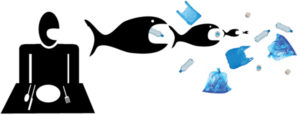No matter where we go, we will always come into contact with single-use plastics; they are a part of our daily lives. This is scary, because we are often too blind to even notice their inherent dangers to the health of humans and the earth as a whole.
What are plastics?
Plastics are made from crude oil. Although there are new innovations wherein plastics are produced from non-oil sources, 99% of plastics are produced from fossil fuels. Further, according to researchers, about 91% of all plastics produced are non-recycled and single-use plastics.
Plastics are used throughout today’s economies and in numerous industrial sectors, including packaging, health care, construction, automotive, aviation, agriculture, logistics and storage, consumer goods, textiles, and many others.
Plastics are inexpensive, lightweight, easily shaped, and are durable. Plastics are valuable materials, and could be recycled to create fresh economic value if properly managed. However, a failure in the market-place and waste management policies to fully account for the external costs that plastic pollution brings, in addition to the indiscriminate disposal of plastic wastes by humans, has led to plastics becoming a major pollutant of the environment.
What are single-use plastics?
Single-use plastics are plastic items ideally used only once before they are thrown away. Some items classified as single-use plastics are: bags, straws, plates, forks, food containers, cups, spoons, knives, etc.
What are the effects of plastics on human health?
Right from the stage of production, plastic plays the villain by providing an easier and low-cost commodity to humans; and, in turn, affects us negatively, since the major chemicals that go into the making of plastics are highly toxic and pose serious threats to human beings, animals, and the natural environment.
Plastics can enter our food chain
In the marine environment, organisms at every level of the food web have been reported to ingest or interact with plastic, and these include higher-order consumers such as fish and humans. Consequently, ingestion of small plastic particles, called microplastics, may be physically harmful if the particles translocate across the cell membrane of humans into the circulatory, lymphatic, respiratory, and/or other biological systems.
Additionally, plastics can be chemically harmful due to the complex suite of chemicals which are added during their production. Many studies have highlighted the possibility of plastics acting as vectors for toxic chemicals and pathogenic agents.
Plastics can adversely impact our biological systems
Some of the constituents of plastics, such as benzene, are known to cause cancer; neurological, reproductive, and development toxicity; impairment of the immune system, and more. These toxins have major impacts on skins, eyes, and other sensory organs; the respiratory, nervous, and gastrointestinal systems; and the liver and brain. Many of the plastics become micro-plastics and go right back into the waterways, where they are then consumed by fishes, and those fishes are consumed by us, humans.
Moreover, did you know that
recycling of plastics can be harmful?
Recycling of plastics is also associated with skin and respiratory problems, resulting from exposure to, and inhalation of, toxic fumes, especially hydrocarbons and residues released during the process.
What can we do?
Single-use plastics have become such a global way of life that we seemingly simply cannot do without them. However, if we start reducing the use of SUP now, in small ways, together it will make a big difference.
We start reducing plastics by making the deliberate switches:
* Choose reusable bags;
* Choose reusable water bottles;
* Choose reusable coffee mugs;
* Choose reusable knives, spoons, forks, plates, straws; and
* Choose reusable food containers, such as glass and ceramic.
“The Environment is Everybody’s Business”
#592saynotoSUP.
Sources:
1- https://serc.carleton.edu/NAGTWorkshops/health/case_studies/plastics.html
2- http://www.plasticfreechallenge.org/what-is-single-use-plastic
3- https://www.ciel.org/project-update/plastic-and-human-health-a-lifecycle-approach-to-plastic-pollution/
You can share your ideas and questions by sending letters to: The Environmental Protection Agency, C/O Communications Department, Ganges Street, Sophia, GEORGETOWN; or email us at: [email protected] or follow us on Facebook, Instagram and You Tube.
